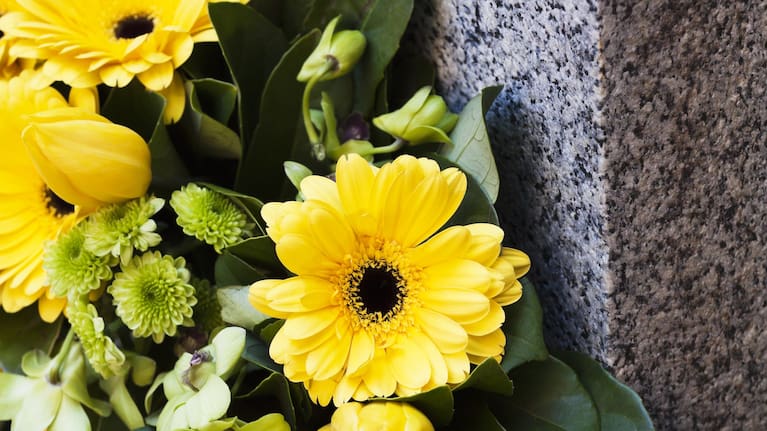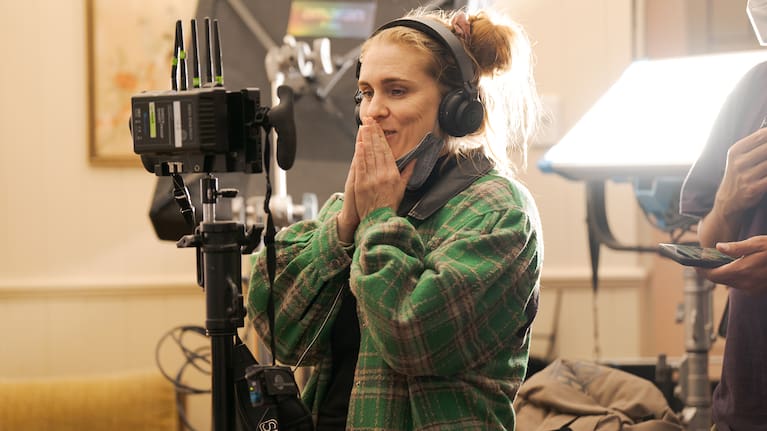From climate change to devastating wars and even the cost-of-living crisis, how do you stay informed without sliding into despair? On the last (official) day of a long trying winter, Felicity Monk offers some tips for cultivating hope in an era of very bad news.
The world is on fire. Can you feel it burning? I’ve been asking people this question a lot lately. What do you do when you read yet another devastating headline like: As a father was registering his twins' birth in Gaza, an airstrike killed the 3-day-olds and their mother at home. And: Hottest Year on record. And: At Least 750,000 on brink of starvation and death in Sudan. And: Cancer cases in under-50s worldwide up nearly 80% in three decades

Where do you put the sorrow? How do you live with the anxiety, channel the outrage, ward off the despair when you read about: Gaza Ukraine Sudan Congo famine the climate crisis the cost of living crisis the mental health crisis bashed babies anxious kids suicidal teens structural racism treatment of indigenous populations rising unemployment the crumbling health system mass redundancies viruses antibiotic resistance superbugs opioid epidemic microplastics biodiversity loss polluted waterways drought flooding extreme heat gun violence the ever-growing gap between rich and poor the threat of AI divisive politics and on and on and on.

While it’s true that many of us are living with greater freedoms, privileges and opportunities than at any point in human history, that doesn’t mean that being alive in 2024 isn’t overwhelming. Things feel particularly grim right now. I don’t think it’s just me. I’ve been having lots of conversations lately about the state of the world. And the consensus seems to be that it’s going to sh**.
I write this as a person born into immense privilege. I am educated and live in a warm, dry home in a first world country. My family and I are fortunate beyond measure. We do not have bombs raining down on our heads. We’re not at risk of polio, we do not live in a tent by an open sewer. I have not lost the people closest to me to genocide, war, famine. But if you believe, as I do, that we are all made from the same stardust; that we are connected to each other, the natural world, the universe, it becomes impossible to turn away from the awful things happening to others. I have an obligation to nurture hope, both for my kids who will have to make their way in the chaos we’ve created and for those suffering through things I can’t even imagine.
And while the world will continue its quiet turning, and the horror and the heartbreak will rage on, regardless of my anguish, I know that giving into hopelessness and futility is the worst course of action, because invariably it leads to no action at all. I feel a responsibility to honour the privileges that have been afforded me, the great good luck that saw me born into a country like ours, into a family like mine.
So, the question then is how do you cultivate hope? The antidote to despair. The thing with feathers, that perches in the soul, according to poet Emily Dickinson. Because hope is more than a feeling, it galvanises us to action. It sees us joining marches and protests. It inspires us to volunteer, donate money, become politically engaged, make ethically-driven purchases, boycott brands, consume less, break bad habits and make good ones.

We need hope now, more than ever, because when you believe that you have the power to make things better, you’re more likely to try. Here’s some things that help me.
Seek out positive news sources
Balance the gloom with goodness. There are loads of websites dedicated to sharing positive news. Here are three.
Reasons to be Cheerful. Artist and musician David Byrne (Talking Heads) launched the nonprofit online magazine in 2019, calling it “a tonic for tumultuous times.” It features feel-good stories from around the world, but more than that, it documents stories of solutions. Byrne says it’s “part magazine, part therapy session, part blueprint for a better world".

Closer to home is Good News, RNZ`s weekly round-up of the week’s most uplifting stories featured on their website.
Upworthy. The social media platform with its 17M+ followers serves me up a little dose of happiness each week by way of email, and has just released a book (September 3rd) called Good People: Stories from the best of humanity.
And then there's Happy to Report, a wrap of the week's good stories featured every week on Breakfast and on this site.

Set your own boundaries when it comes to what you watch and read
It’s tricky maintaining a balance between staying informed and aware of what’s happening in the world, while protecting oneself from the relentless heartache and negativity. As actor and director Aidee Walker says: ‘What a privilege we have to turn off from the horrors of the world – just like that!’ And she’s right.
But there are some things I cannot bear to see – particularly when it involves children in pain – and I don’t believe averting my eyes will make me care any less. Musician Anna Coddington feels the same way. She has resolved to never look at pictures or watch videos of dead children. “They are tapu and not for my eyes. It’s not going to help me to serve them, or further that cause in any way.”

On days when I really need to smile, I seek out videos of piglets, fat babies, people who can’t wave properly and little kids getting hearing aids – all things that cheer my heart.
Connect to the land
Take your shoes off and stand in actual dirt. Sand. Grass. Connect your feet to the earth, to Papatūānuku. Swim in the sea. Forest bathe. Decades of research has shown being in nature is good for your health; it can boost your immune system, lower blood pressure and help with depression. Look to the sky and beyond. You are part of it all.

Be grateful
When you live your life with gratitude, you wind up noticing the good stuff; the beauty in the world, the kindness of strangers. Like the way sunshine gets caught in a cobweb, the perfect avocado, the traffic light turning green just as you approach it, your child doing the thing you’ve asked them to do the first time you asked them to do it. Consciously acknowledging these small moments makes you feel good and, in turn, you begin to notice more and more of them. Collect them like precious pebbles. Keeping a journal, or even just a list on your phone, makes it easy to capture these little wins, you can add to them with ease and you can check them out when you need a boost.
Raise good humans
As a mother, I sometimes think, was it unfair to bring children into this world, into the mess we have made and will leave behind? A futile thought I know, given that they are here now. So, I do my best to raise thoughtful and kind humans. I tell them: Take only what you need. Give more than you take. Do better. Be better. You get to be a part of what makes the world beautiful and good. You get to be part of the solution.
Feel the pain - but don't get stuck
Sitting with your feelings rather than running from them is a skill often linked with mindfulness, which can look like a lot of different things – meditation, breathing techniques, guided imagery, being intensely aware of what you’re sensing and feeling in the moment, acceptance without judgment. However you want to approach it, its goal is the same: achieving greater peace and wellbeing.
It’s a real skill, giving yourself permission to feel pain and grief without getting stuck. There’s an excellent analogy that psychologist and pioneer in mindfulness-based behavioural therapy Marsha Linehan teaches: You can visit a cemetery without building a house there.

Believe in our interconnectedness
We are all connected to a larger whole. What we do here matters everywhere and our actions – however small – have an impact on the collective. It’s science, guys.
Do what you can
While you alone cannot stop the planet warming, there are infinite ways you can walk more lightly upon it. You can’t end the rule of dictators and warlords, but you can vote for people who represent the kind of change that you want to see both in our communities and in the world. You won’t eliminate prejudice on your own, but you can educate yourself around our colonial history and the part it plays in structural racism and inequality. You can’t singlehandedly save people in war-torn countries from the daily horrors they face, but you can donate your tax cut to war-torn regions. You can even do it right now.
Use your platform, if you have one
Some of us have more of a platform than others. Aidee Walker is tireless when it comes to using hers. Next month, she will appear on the tv show Celebrity Treasure Island. It’s not normally her kind of thing – when invited her initial thought was: “hahahaha” – but when she learned she could compete on behalf charity she decided to do it. Her chosen charity, Relief Aid, delivers water, food, shelter and education to war torn areas.

Anna Coddington, who has had a long career as a celebrated musician and is currently studying law at AUT, recognises that she has “a small platform” and feels an obligation to use it. Particularly to speak on things she feels strongly about. She is considered about how she engages with others and endeavours to do so in a way that might shift people’s thinking, as opposed to galvanising the people who already agree with her. “I think there’s a place for outrage, rallying people, getting people upset about the issue, we need to do that, but we do need to try to have dialogue sometimes, rather than just another angry voice.”
Choose hope
Hope is a choice. It’s a decision. It is the conviction that one can act to make things better in some way. So decide to hope, instead of waiting for it because that’s the only way that we’ll be able to show up for those who have it far worse than us. It’s the very least that we can do.
Felicity Monk is a journalist and fiction writer based in Tāmaki Makaurau, Auckland.



















SHARE ME